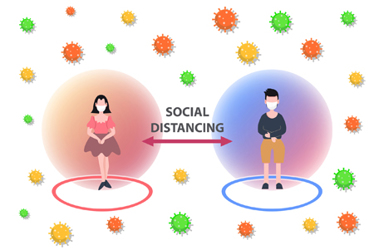WWEMA Window: Environmental Quality Of Life And Social Distancing
By Eric LaCoppola

COVID-19 (coronavirus) is now an official pandemic. This global crisis started in December 2019, and in just three months the new reality of normal life in the U.S. is not so normal. The first signs that this was not just a passing scare was when I received notice that my oldest daughter’s university was going to close for several weeks following a scheduled spring break, and to prepare for a possibility that the semester would be finished exclusively through distance learning. The second alarm to our family was a day later when the local school systems announced a four-week closure. Schools have never closed in my lifetime like this, signaling we are entering uncharted territory. Now, New York state and others have closed all gyms, bars, and restaurants to prevent mass gatherings of people. Many national retailers have announced closings of stores for the same period as many of the schools. The speed of information flow and government regulatory guidance updates on social media and traditional national television programming have been critical to further heighten awareness and get critical messaging out. The communication mediums of today have increased the speed of information flow to levels unimaginable just a few years ago. I can only hope that the connectivity that we now enjoy as a society can help express the severity of the situation we are in and help provide a platform to assist in managing through this crisis.
Social distancing is one solution that will to allow for a “flattening” of the curve of COVID-19. This is something each of us can do to help contribute to the timeliest reduction of this pandemic and speed the passing of this virus. It’s a major challenge as manufacturers: How can we adjust to do our part?
Easy changes can be done — cancel sales meetings, reduce travel, allow as much work as possible to be done remotely, increase sanitization efforts in the workforce, extra washing of hands, and constant reminders of good hygiene. But at what point do we send our employees home and stop building products? That is an extremely complex question. Beyond the obvious profit and loss impact, WWEMA members serve a market that provides clean water to millions and millions of people. This is not a discretionary “nice to have” such as an expensive cup of coffee; this is not losing the ability to sit in a restaurant and have a meal; this is not the ability to go into a retail store and purchase a certain brand of shoes; this is the ability to turn your faucet on and have confidence that water will flow.
If a utility needs WWEMA member-built products, we have a responsibility to provide needed products to allow the utility to continue delivering their product, which is clean water. Clean water is essential for life. Hopefully, all members recognize this and have prepared contingency plans for adequate procedures and stock for emergencies like this.
I’m very fortunate to travel the world and help solve problems working with municipalities, developers, contractors, and homeowners. Many times, I introduce my company’s role as a provider of environmental quality of life. Often this gets a curious look. They sometimes push back and say aren’t you selling a pump that moves wastewater or sewage? Many times, they may volley back a more graphic term for human waste and “pump”. This starts a nice dialogue that usually involves me doing a mini lecture about how a proper wastewater collection system brings wastewater back to a treatment plant to be cleaned and the water is then recycled for further use. Proper wastewater collection systems keep human waste out of the bodies of water, and clean waterbodies yield environmental quality of life. So yes, the solution we sell truly does improve environmental quality of life. This includes every single WWEMA member and their products.
Beyond the products and services WWEMA members provide, there is the most critical connection to environmental quality of life — the professionals employed by private and public water authorities who operate wastewater treatment plants, water plants, and the crews maintaining collection and distribution infrastructure. During a hurricane, flood, earthquake, blizzard, or any other extreme weather-related event, the public works staff must be on the job, and often they are not given the credit they truly deserve.
During this latest COVID-19 crisis, as schools are closed, business are closed, and many are told to stay isolated in their homes, just know that when you turn the faucet on and water comes out, there is a person working at your water provider 24/7 behind each drop. When this crisis passes, and social distancing is a forgotten term, please join me in paying it forward when you see a water/sewer crew at a coffee shop or restaurant. Pick up their tab and say thank you! It’s something they don’t hear enough!
Eric LaCoppola is President of Environment One Corporation and a Board Member of the Water and Wastewater Equipment Manufacturers Association (WWEMA). WWEMA is a non-profit trade association formed in 1908 to represent water and wastewater technology manufacturers and related service providers. WWEMA is made up of many of the most prominent and influential companies in the industry who are working together to shape the future of water and wastewater technology in the U.S. and around the world. WWEMA has been tracking federal, state, and local impacts of the COVID-19 pandemic and has created a Fact Sheet with critical links and resources for our members. The public can access this information on our home page at www.wwema.org. Interested in becoming a WWEMA member? Contact WWEMA Executive Director, Vanessa Leiby, at vanessa@wwema.org.
